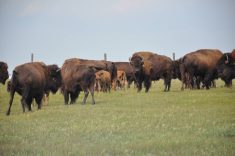OTTAWA — Canada’s beef quality assurance program is expanding.
The verified beef program is adding environmental care and animal welfare models, said manager Terry Grajczyk.
The Canadian Cattlemen’s Association program has trained 18,000 producers and validated 1,100.
It provides workshops to producers on procedures for improving biosecurity and animal health. They may go to the next step following the training and have their practices validated, which then registers them in the program.
The additional components, which are in development, are partly in response to increasing pressure from retailers to certify practices from gate to plate.
Read Also

Trump’s tariffs take their toll on U.S. producers
U.S. farmers say Trump’s tariffs have been devastating for growers in that country.
“We are doing it now so we can document it all the way up the value chain,” said Rob McNabb of the CCA.
The goal is to inspire confidence in what is happening on Canadian beef operations.
The pork, poultry and dairy sectors have already added these modules, and federally inspected plants no longer accept pigs unless a farm is part of the quality assurance program.
The broiler industry has a mandatory quality assurance program for animal health and welfare. Producers must be registered, and it is included as part of their production quota.
Packers have not yet told producers that they must be part of these programs as a prerequisite for accepting cattle.
“We don’t have the mechanism to make it mandatory,” McNabb told the CCA’s annual meeting, which was held in Ottawa March 4-7.
However, more companies are introducing their own specifications on what they want from suppliers, including A & W, McDonald’s, Lob-laws, Sobeys and Calgary Co-op.
Ryder Lee of the CCA’s Ottawa office said the industry needs to work with these companies in partnerships, whether they are looking for generic, organic, natural or certified humane beef.
“I think it is here to stay. We are working down the right road on the farm animal council to produce sustainable beef,” he said.
“We are on the road to being able to provide them with something devised by us, not somebody else.”
He said the public thinks livestock care should be regulated without knowing that codes of practice already exist. As a result, demands are increasing to prove that producers are taking care of their animals.
Lee said few consumers are aware that Canada has a National Farm Animal Care Council, which develops codes.
However, Bryan Thiessen of Strathmore, Alta., said producers attending the convention’s animal care committee meeting said retailers who want more health and welfare certification should initiate and pay for these programs rather than forcing cattle producers to do so.















